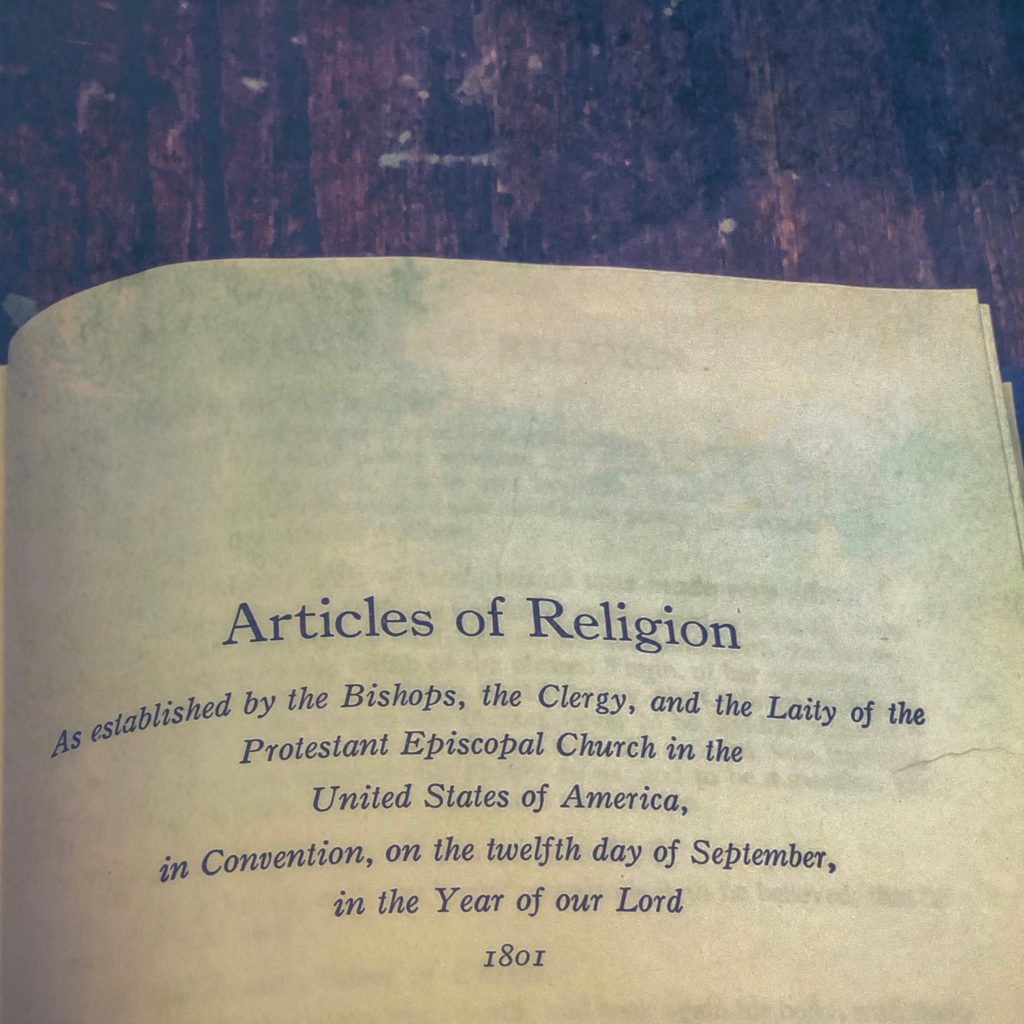
The condition of Man after the fall of Adam is such, that he cannot turn and prepare himself, by his own natural strength and good works, to faith; and calling upon God. Wherefore we have no power to do good works pleasant and acceptable to God, without the grace of God by Christ preventing us, that we may have a good will, and working with us, when we have that good will.
by Tyler Conway
Article X stresses the inability of human beings to choose what is good and acceptable to God, rendering humanity completely dependent on God’s grace. The point here is not concerned primarily with the debate of God’s sovereignty and human freedom as much as it is focused on the nature of the will in light of human depravity. In essence, Article X affirms what Martin Luther argued in his The Bondage of the Will (1525), namely that human beings cannot possibly, by their own strength or merit, have faith apart from the grace of God.
Simply put, at the heart of Article X is the fact that humanity can neither turn in faith to God nor do good works apart from the work of Christ within the believer. That said, it would be dishonest to suggest that the question of human freedom is not at all a contentious matter. It is therefore fitting to deal with some of the questions that may arise from what is presented in Article X. How are we to think of human free will? What exactly can be said of free will in light of our sinful nature? I will do my best to deal briefly with these questions, providing an alternative way for understanding human freedom that is in accordance with what is professed in Article X. I will then briefly touch on the issue of justification, though this will be the primary focus of Article XI. I do, however, want to clear up some confusion and highlight the dispute between Reformed Protestants and Catholics on the matter of human freedom and grace.
Now, human free will is no small subject. To say that humanity has no free will is to spark uproar, misunderstanding, and even denial. What Augustine and Calvin both suggest when using the term “free will” is that we are essentially free of all righteousness and enslaved to sin. Preferably, we should only use the term “to mock its empty name.”[1] John Calvin writes, “If anyone, then, can use this word without understanding it in a bad sense, I shall not trouble him on this account. But I hold that because it cannot be retained without great peril, it will, on the contrary, be a great boon for the church if it be abolished.”[2] Calvin continues by claiming that he personally prefers not to use the term altogether, and he advises others to do likewise since free will cannot account for good works. As Luther asks, “For what need is there of Christ and the Spirit, if we have good works and merits through free will?”[3]
Some may suggest that if human free will is abolished, so too then is reason. However, it’s important to note that neither human reason nor human will are completely and utterly abandoned. Even Calvin admits that while the supernatural gifts are extinguished, the natural gifts are corrupted, but still present. Human reason serves to distinguish between good and evil, though it must be emphasized that this ability is tainted by sinful nature. Regarding the will, Calvin writes, “the will, because it is inseparable from man’s nature, did not perish, but was so bound to wicked desires that it cannot strive after the right.”[4] Thus, while it is helpful to think of reason in this way, this does not avoid the fact that humanity lacks freedom. We may ask, “What then can we say of free will? Ought we to simply accept Calvin’s suggestion and dismiss the word entirely?”
Here, it seems appropriate to ask what we mean when we use the term “free will.” For many, the natural inclination is to think of free will as limitless potentiality regarding our choices and actions. In other words, we like to believe that the choices we make are entirely ours, innumerable, and free from any and all influence. However, as I understand it, such a notion of human freedom is somewhat misguided for it ignores the very real and unpredictable forces that play a role in our decision-making. The truth is, we are always captivated by something not wholly of our own will. More often than not, the choices we are faced with in life are the result of a prior series of events, most of which are completely out of our control from the very start. Of course, this is not intended to be an argument for determinism by any means, for even those convinced of a more open and free universe admit this much at least. Still, it’s an important point worth keeping in mind when approaching the meaning behind freedom.
Perhaps then no one is truly free in this sense. We are always enslaved to something, whether we like to think so or not. Yet, the emphasis behind Article X is that our sinful nature limits us entirely for we are enslaved to ourselves. To put it another way, we can only ever turn away from God unless God intervenes. For this reason, we cannot say much, if anything, about human freedom and capability. This was indeed Luther’s argument against Erasmus when he asserted, “It follows, therefore, that the free will, without the grace of God, is not absolutely free, but is immutably the captive and slave of evil, since it cannot, of itself, turn to good.”[5] We are either enslaved to our own sinful nature and inability to choose God or we are made free to turn to God by the power of His grace alone. With this in mind, perhaps there is a more helpful way to understand free will.
Orthodox theologian David Bentley Hart (who, I might add, is not very fond of Calvinism) puts it this way: “A higher understanding of human freedom, however, is inseparable from a definition of human nature. To be free is to be able to flourish as the kind of being one is, and so to attain the ontological good toward which one’s nature is oriented; freedom is the unhindered realization of a complex nature in its proper end (natural and supernatural), and this is consummate liberty and happiness.” Hart continues, “The will that chooses poorly, then—through ignorance, maleficence, or corrupt desire—has not thereby become freer, but has further enslaved itself to those forces that prevent it from achieving its full expression.”[6]
Thus, we are incapable of choosing God apart from God’s gracious work precisely because we are not free to flourish as the kind of beings we are. We are not free to attain the ontological good of our nature since our nature is itself corrupted by sin. Thought in this way, the question regarding human capacity to arbitrarily choose from a range of limitless possibilities becomes moot and, frankly, uninteresting. Moreover, it appears that the concept of freedom can still be affirmed in a very real sense. Instead of disposing of the concept of freedom, we can choose to view freedom in light of who we were always meant to be as those created in the image of God.
Consequently, because faith and good works are an impossibility apart from God’s own doing, we are compelled to call faith itself a gift. We therefore echo with the Apostle Paul, “For it is by grace you have been saved, through faith—and this is not from yourselves, it is the gift of God” (Eph. 2:8).
Now, since Article X asserts all of these things about faith, works, and grace, it necessarily implies that no one is justified by his or her own good works. Despite the fact that the term “semipelagianism” gets thrown around loosely, both Protestants and Catholics rightly reject the error of Pelagius who denied original sin and grace.[7] Both have also rejected semipelagianism, which was condemned as heretical in the Lutheran Formula of Concord in 1577 and much earlier at the Council of Orange (529). The major issue at hand has primarily to do with the question of synergism—the notion that man can freely cooperate with God’s grace—and this is precisely what Articles IX-XIII reject.
Of course, it’s unlikely that this debate will ever be resolved, and some might even accuse the Roman Catholic Church of semipelagianism today. One reason for this may be due to paragraph 1730 of the Catechism of the Catholic Church, which states, “God willed that man should be ‘left in the hand of his own counsel,’ so that he might of his own accord seek his Creator and freely attain his full and blessed perfection by cleaving to him.”[8]However, to charge Catholics with semipelagianism because of this is, in my opinion, quite uncharitable to say the least.
Nonetheless, I make no apology for the differences between the Reformed and Catholic Church, but I do believe there is much in common worth celebrating on this important matter. The Joint Declaration on the Doctrine of Justification seems, to me, one such occasion for recognizing areas of agreement. As the Declaration affirms for both Lutherans and Catholics: “Together we confess: By grace alone, in faith in Christ’s saving work and not because of any merit on our part, we are accepted by God and receive the Holy Spirit, who renews our hearts while equipping and calling us to good works.”[9]
There is much more that could be said of justification, but that shall be dealt with more appropriately in Article XI. Suffice it to say, Article X leaves no room for human merit. Because of the foundation laid for us in Article IX on the matter of original sin, we acknowledge that humanity has no strength, no merit, and no freedom to earn God’s grace. Grace is freely given to us, allowing us to turn in faith to God and know true freedom. That is indeed good news.
Tyler Conway is a 2018 graduate of George W. Truett Theological Seminary. He is
currently serving as a hospital chaplain and resides in Waco, TX with his wife,
Karleigh. You can find more of his opinions at Theology Studio and The Augustinian.
[1] McNeill, John T. Calvin: Institutes of the Christian Religion. Vol. 1, Westminster, 1960. pg. 266.
[2] Ibid. 266.
[3] Luther, Martin, and Edward Thomas. Vaughan. On the Bondage of the Will: to the Venerable Mister Erasmus of Rotterdam, 1525. 1823. pg. 209.
[4] McNeill, John T. Calvin: Institutes of the Christian Religion. Vol. 1, Westminster, 1960. pg. 271.
[5] Luther, Martin, and Edward Thomas. Vaughan. On the Bondage of the Will: to the Venerable Mister Erasmus of Rotterdam, 1525. 1823. pg. 120.
[6] Hart, David Bentley. The Doors of the Sea: Where Was God in the Tsunami? Wiliam B. Eerdmans Publishing Company, 2011. pg. 71.
[7] “Pelagius and Pelagianism.” CATHOLIC ENCYCLOPEDIA: Pelagius and Pelagianism, www.newadvent.org/cathen/11604a.htm.
[8] Catechism of the Catholic Church – Man’s Freedom, www.vatican.va/archive/ccc_css/archive/catechism/p3s1c1a3.htm.
[9] Joint Declaration on the Doctrine of Justification, www.vatican.va/roman_curia/pontifical_councils/chrstuni/documents/rc_pc_chrstuni_doc_31101999_cath-luth-joint-declaration_en.html.
